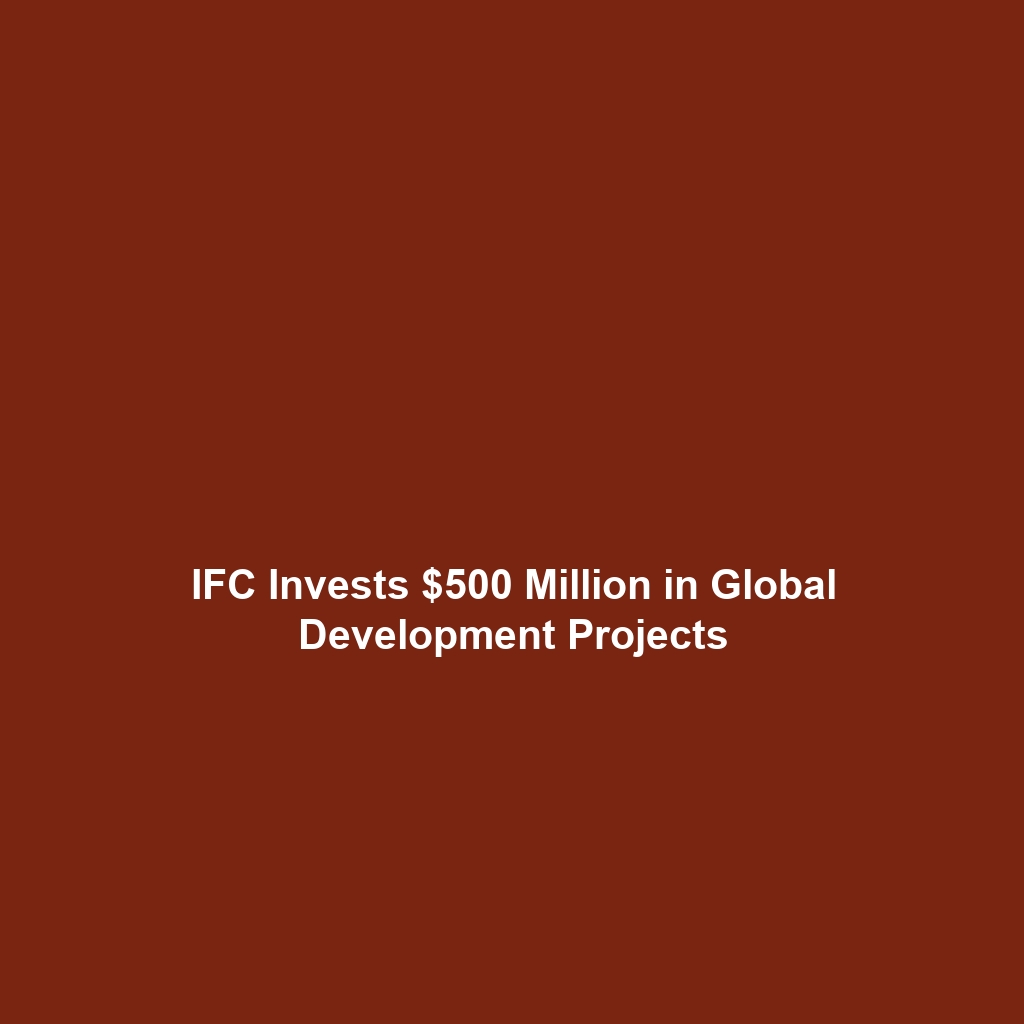Your cart is currently empty!
IFC Invests $500 Million in Global Development Projects

IFC Invests $500 Million in Global Development Projects
The International Finance Corporation (IFC), a member of the World Bank Group, has announced a substantial investment of $500 million aimed at supporting infrastructure and sustainability projects across the globe. This strategic move is designed to bolster economic growth and enhance environmental sustainability in developing nations, reflecting a renewed commitment to private-sector development in key sectors.
Overview of the Investment Initiative
The IFC’s recent funding initiative comes as part of a broader strategy to bridge the financing gap in critical infrastructure projects around the world. The organization has identified a pressing need for investment, particularly in emerging markets, where infrastructural deficiencies can hinder economic progress and resilience against climate change.
According to the IFC, these funds will be allocated to a variety of projects focusing on sectors such as renewable energy, urban development, and transportation. This diversified approach is aimed at not only stimulating economic growth but also fostering sustainable practices that align with the United Nations Sustainable Development Goals (SDGs).
Addressing Global Challenges
The global landscape is facing numerous challenges, including poverty, climate change, and rapid urbanization. The World Bank Group estimates that developing countries need approximately $3.7 trillion annually to meet their development needs, which underscores the significance of the IFC’s investment.
“We believe that private sector investment is crucial for driving development and improving livelihoods in developing nations,” said Makhtar Diop, Managing Director of the IFC. “This $500 million funding is designed to catalyze additional investment and create opportunities for sustainable growth.”
The Importance of Sustainable Development
Sustainable development is at the core of the IFC’s mission. The organization’s investments are guided by principles that prioritize environmental protection, social equity, and economic viability. By channeling funds toward projects like renewable energy and efficient transportation systems, the IFC aims to foster a green economy that benefits communities while combating climate change.
The recent investment is anticipated to contribute significantly to several green infrastructure endeavors, which are essential in reducing reliance on fossil fuels and minimizing environmental degradation. Projects that harness solar, wind, and hydroelectric power are among those that may benefit from this infusion of capital.
Targeted Areas for Investment
The IFC has outlined specific regions and sectors that will be targeted for investment with the new funding. These include:
- Renewable Energy: Increasing funding for solar, wind, and hydro projects to ensure a transition to clean energy sources.
- Urban Development: Enhancing urban infrastructure through sustainable building practices and improving public transportation.
- Agriculture: Supporting agricultural initiatives that focus on sustainable farming techniques and improving food security.
By prioritizing these areas, the IFC aims to not only create jobs but also improve living standards in communities across various regions, especially in sub-Saharan Africa and South Asia, which are among the most affected by infrastructural deficits.
Expected Outcomes of the Initiative
The IFC anticipates that this investment will lead to significant socio-economic benefits, including job creation, economic diversification, and improved access to essential services. Additionally, the funding is expected to leverage additional private-sector investments, magnifying the overall impact and effectiveness of the deployed capital.
Experts believe that the IFC’s investment is timely and crucial. “This kind of funding is important for creating an enabling environment for private investment in infrastructure, which is fundamental for economic development,” noted Dr. Rebecca M. McDonald, an economist specializing in development finance.
Conclusion
The International Finance Corporation’s $500 million investment marks a significant step toward addressing pressing global needs in infrastructure and sustainability. By focusing on clean energy, urban development, and agriculture, the IFC is setting a precedent for sustainable growth in developing countries.
As the world grapples with the dual challenges of economic recovery and climate action, the role of organizations like the IFC in mobilizing resources for development projects becomes increasingly vital. This initiative not only reflects a commitment to sustainable principles but also highlights the critical need for innovative funding solutions in addressing global challenges.
Leave a Reply